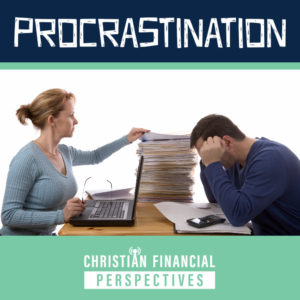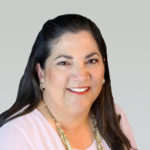Click below to listen to Episode 16 – Procrastination
Subscribe: Apple Podcasts | Google Podcasts | Spotify | Amazon Music | Stitcher | RSS | More
Episode 16 – Procrastination

Bob and Mary Jo talk about one of the main reasons for financial failure in almost every area of your finances – procrastination.
Many find themselves in a revolving cycle of putting off financial matters that need to be done. Could you be in this cycle? Bob and Mary Jo talk about one of the main reasons for financial failure in almost every area of your finances – procrastination.
Procrastination is the #1 reason for financial failure. Typically, it’s only when a crisis hits that people get spurred into taking action. Unfortunately, by not being proactive and planning ahead, your choices can become very limited.
This episode focuses on 5 important financial areas that should never fall victim to procrastination. With a new year comes the opportunity to start it off right and begin accomplishing all those things you’ve been needing to do but haven’t because you been procrastinating.
HOSTED BY: Bob Barber, CWS® and Mary Jo Lyons, CFP®
Mentioned In This Episode
Want to ask a question about your specific situation? Schedule a complimentary 15 minute phone call.
EPISODE TRANSCRIPT
[INTRODUCTION]
Bob: Welcome to Christian Financial Perspectives, a weekly podcast where we talk about ways to integrate your faith with your finances. This is Bob Barber.
Mary Jo: And I’m Mary Jo Lyons.
Bob: Are you ready to learn how to apply biblical wisdom to everyday financial decisions?
Mary Jo: Join us as we look at integrating your faith with your finances. If it’s your first time listening, welcome to our podcast, and if you’re a returning listener, welcome back.
[EPISODE]
Bob:
The definition of procrastination – to be slow or late about doing something that should be done; to delay doing something until a later time because you don’t want to do it. Now, James 4:13-14, “Come now you who say today or tomorrow, we will go to such and such a city and spend a year there and engage in business and make a profit. Yet you do not know what your life will be like tomorrow. You’re just a vapor that appears for a little while and then vanishes away.” Hi, Mary Jo.
Mary Jo:
Hey Bob. I want to take a minute and wish all our listeners a Happy New Year. I just can’t believe we are on the cusp of 2019. Gosh, where does time go?
Bob:
I don’t know. Me either.
Mary Jo:
Oh man. Well, in today’s podcast, we’re going to talk about one of the main reasons for financial failure in almost every area of your finances, whether it’s retirement planning, tax planning, education planning, risk planning, like liability, life insurance, disability, or even thinking about longterm care insurance and estate planning, especially, and setting up for that will for your family. Procrastination is one of the biggest and most dangerous reasons for financial failure. We always think we’re going to get to it tomorrow. Tomorrow never comes.
Bob:
Exactly right. And with the new year comes the opportunity to start it off right and begin accomplishing all those things you’ve been needing to do, but you’ve been procrastinating about, but we don’t want you to feel alone, as we all are prone to procrastinate. It’s very easy to put off those things we all need to do, especially financial matters. Today, we’re going to focus on five important financial areas that one should never fall victim to procrastination, as it’s very costly to do this for yourself, as well as for those you love.
Mary Jo:
Procrastination is definitely the number one reason for financial failure. Typically it’s only when a crisis hits that people get spurred into taking action, and usually that can be a little too late. And when that happens by not being proactive, sometimes you’re not planning ahead. Sometimes, your choices become limited. That’s one of the very reasons to get it done and get your wishes in place while you still have control over those wishes. Many find themselves in a revolving cycle of putting off financial matters that need to be done. Could that be you? Could you be in this cycle? When it comes to financial matters, that cycle can look something like this.
Bob:
Okay, Mary Jo. So, here we go. We’ve really gotten to the definition of procrastination. Let’s share some good scripture. It’s January, but we’re just now getting over December. Could this be done in March? What do I need to do?
Mary Jo:
Well, it’s March, but with taxes coming up in April, I’ll plan to take care of this in May.
Bob:
Oh, okay. Well it’s May, but the kids or grandkids are graduating. Why don’t we tackle this in July?
Mary Jo:
Summer. It’s always easy to get to it in summer. It’s July, but with summer vacation, how about we just wait until August?
Bob:
Well, oh no. It’s August. The kids and the grandkids are just starting school. Could we wait at least until September or October to get this done?
Mary Jo:
Now it’s October, but we’re just so busy with the kids and the grandkids and all their school activities and all the fall festivals. I don’t think I’ll have time to do this until next month.
Bob:
Now, it’s November. It’s Thanksgiving coming up. Can we wait to get this done until December after Thanksgiving and holidays are over?
Mary Jo:
Sure, Bob. December’s always a good time. Ah, but now I’ve got Christmas parties and getting ready for the family to come in, all our visitors. I think we should probably just wait until next year. Maybe it’s time to just step off that spinning wheel. Is there ever really a convenient time? No, not really. Make this the year you prioritize and make that appointment to get all your financial house in order.
Bob:
Well, I tell you, Mary Jo, what we just went through is a scenario that I have been hearing for over 25 years that I’ve been in financial advice and planning. It is amazing. Hopefully, somebody could relate to this little scenario because it’s really never a convenient time. So now, let’s get into what we see. I see. I’m sure you see this too, Mary Jo. One of the main things people procrastinate about and one of the reasons that the first question we always ask when someone comes in for a review is estate planning. How long has it been since you’ve updated your estate planning documents or your will? And Mary Jo, I’m finding that many people, you ask them, how long has it been since you updated it? They look at you like, wait a second. I’ve never even done a will. It doesn’t matter where you are in the spectrum. I have a person we’re working with right now that has $6 million, and they haven’t done their estate planning ever, and they’re a business owner. I’m just amazed.
Mary Jo:
Oh goodness.
Bob:
Then you’ve got the other end of the spectrum with someone with $10,000 is just starting off and they haven’t done their so it’s everywhere in between. There’s a good scripture that will motivate all of us, I believe. And that’s Proverbs 20:21, “An inheritance gained hurriedly at the beginning will not be blessed in the end.” It’s so important when we think about estate planning that we hand those assets off wisely to those that we love and care about. And I know, Mary Jo, you and I have done a podcast on estate planning that somebody could go back and listen to this called “Estate Planning: The Wrong Way, The Right Way.”
Mary Jo:
I think probably estate planning is one of the most critical issues that we’re going to talk about today. I always like to be very positive on our podcast, but I always think it’s also important for us to share stories and to talk about some examples. I have one that’s very personal to me and very timely. We’re coming up on October and it’s actually almost the one year anniversary of a very tragic event that happened to my next door neighbor. She was a young mom with two kids and walking her little boys to school one day last year, and a lady ran a stop sign and hit them both. She was killed. The mom was killed. Luckily, she and her husband had talked about their wishes. So he kind of knew what she wanted, but that kind of thing, it’s tragic, but it could happen so easily. Just this morning, I went to a meeting and I saw the kids outside, waiting for the school bus. I don’t wish anybody harm, but you just never know what can happen. So, don’t put that off. It’s so important to have all those documents in place, especially a healthcare directive and a healthcare power of attorney. You might be incapacitated, and you can’t predict those things.
Bob:
You know, Mary Jo, I think this goes right with the scripture that we started off with in James 4:13-14. And that 14the verse said, “Yet you do not know what your life will be like tomorrow. You’re just a vapor that appears for a little while and then vanishes away,” which is another reason we need Jesus so much. Our life here on earth is just a blip compared to eternity. That’s the importance of estate planning because you just don’t know if you’re going to be here tomorrow.
Mary Jo:
That’s right. Another key area that we want to look at is risk management. A lot of people don’t understand necessarily what we mean by risk management, but it is transferring the risk, typically, to an insurance company. So, this is really all about insurance and making sure you’ve got all those T’s crossed and the I’s dotted. In Ecclesiastes 11:2, “Invest in seven ventures. Yes. In eight. You do not know what disaster may come upon the land.” In risk management, then insurance policy. So, how long has it been since you’ve gone over your insurance policies? Have you done an insurance review? I always recommend talking with an independent insurance advisor to just assure that you’ve got the right coverage, that it’s cost effective, that it’s still relevant, and you still have the need for that insurance or do you need more? You may think you’re well covered in the event of an accident or some sort of disaster, but that’s not always the case. I noticed after Hurricane Harvey, this became a real issue and a lot of people didn’t have the coverages in place that they thought they had. Here’s another personal story. I was talking to a friend of ours who was also a condo owner down in Rockport in the same complex that we were. We just happened to be having dinner, and this was really about a month before the storm hit and somehow got talking about insurance coverage. I said, “Yeah, we need to probably up our personal coverage on our condo policy.” He looks at me and he goes, “Condo policy, what do you mean?” And I go, “Well, you have to have your own personal condo.” He goes, “Doesn’t the complex have that?” And I go, “Well, the association has a policy, but it only covers the exterior that is out in all of the common elements and the roof and the siding, but it doesn’t cover the sheet rock in or your personal contents. That’s what you have to have.” He said, “Oh, I didn’t know I needed that.” And I go, “Yes, you do.” Well, he called his agent the next morning and got it in place. Harvey hit less than three weeks later.
Bob:
Wow. I’ll tell you what Ron up here with Christian Insurance Services is always telling me stories. Mary Jo, about people that bought insurance strictly on price through one of these advertisements they saw on TV that nearly played insurance. As a joke, you should never buy insurance by stone price. You should buy insurance based on coverage. That’s right. That’s what people do. They buy based on price. And it’s always, you know, call this amount and you’re going to save 15 or 20 or 30% more on your insurance. Be careful that Ron has told me some really sad stories about people that have done that. And then they got in a car accident, very, very little was covered. And maybe even some lawsuits have come out of that. There’s one particular one I know of that lawsuit came out of it. Insurance didn’t cover them because they bought one of those insurance companies that are always advertising on TV. And it was just all about price.
Mary Jo:
Well, you want to make sure you’re looking at what is covered and what is not covered. The things that are itemized that are not covered, that’s just as important as what is covered. Just making sure that you’ve got your depreciation and the increased cost of construction is covered. Also, that you have the property liability limits. So, we can certainly talk about that more and if you have questions, we’d be happy to guide you through that.
Bob:
We’re going to have a whole show on just insurance coverage one of these days. Again, if you procrastinate on that one, that can hurt. We’ve covered the first two so far, estate planning and risk management. The third one is saving and investing for the future. We’ve used this one quite a few times as scripture. It’s always kind of funny in a way. I mean, just the way it starts off in the beginning is from Proverbs 6:6-8, “Go to the ant, you sluggard. Consider its ways and be wise. It has no commander, no overseer or ruler, yet it stores his in summer and gathers is food at harvest.” This really talks about speaking to savings and investing for the future. When that time comes that you’re going to need that savings, or you’re going to need that retirement plan and you’ve procrastinated for too long, it can become too late. Every once in a while, Mary Jo, I will meet people that they’re 60 years old and they’re saying, well, I need to start saving for my retirement now. I hate to tell them, I mean, it’s never too late, but that’s pretty late in the game.
Mary Jo:
So many wait until after the kids are gone and out of the house or out of school, and you should be saving simultaneously for those things.
Bob:
It’s a question that you need to think about right now. Like, how long has it been since you’ve had an annual review to make sure you’re on the right path for your specific situation? Are you well positioned for a major, potential downturn in the markets, as well as a major rally to take advantage of them in your portfolios? Are you aware of exactly how all your investments are positioned in your old 401K’s, if you’ve left a job for another job, or 403B’s, IRAs, or old brokerage accounts. Should you reposition your CDs or savings to another financial institution for a better rate of return? Procrastination for very long on this one could mean, again, thousands of dollars.
Mary Jo:
People think that they are diversified because they have all these various accounts, but what I find is there’s so much overlap because they’re all invested in the same thing. Have you looked at the entire picture and made sure that everything is utilizing the best in class choices in each of the various retirement accounts? It’s very, very important. Next, we come to tax planning in Romans 13:5-7, “Therefore, it is necessary to submit to the authorities, not only because of possible punishment, but also as a matter of conscience. This is also why you pay taxes, for the authorities are God’s servants who give their full time to governing. Give to everyone what you owe them. If you owe taxes, pay taxes. If revenue, then revenue. If respect, then respect. If honor, then honor.” So, I think taxes are, I’ve said this before, a sign of God’s provision that we’ve been fortunate to earn money and make money. We do owe our fair share. We want to pay that, and not begrudgingly, but we also don’t want to pay more than we need to. Doing everything we can to plan for taxes, to make sure that we are spending in a tax efficient manner, that we’re investing in taxable accounts. Are those invested in a tax efficient manner? So, we want to make sure we’re looking at all those things, planning throughout the year, and not procrastinating around this because of that word taxes. It always makes us, “Oh, I don’t want to have to deal with that,” but you could be costing yourself significantly, and you could use money for better causes.
Bob:
So far, we’ve covered estate planning, risk management, savings, and investing for the future, and tax planning. The last thing we’re going to cover for today’s podcast is budgeting. This is definitely one you don’t want to procrastinate on either. Mary Jo, I know you have a great scripture that you found.
Mary Jo:
In Proverbs chapter 27: 23-24, “Be sure you know the condition of your flocks. Give careful attention to your herds, for riches do not endure forever and a crown is not secure for all generations.” Making sure you know where everything is and what you’re spending – are you tracking your expenses? I don’t think you necessarily have to track them daily, but it’s important to monitor those and keep up with them. One of the things in today’s times, probably 90% of us pay our expenses – like groceries, eating out, or gas – all on credit cards or using a debit card. But you’re constantly hearing about cards being compromised or retailers being compromised, and you never know whether you’ve been impacted by that or not. Those can be pretty widespread. If you don’t sit down and take an approach in a discipline to actually look at those accounts and see where those spendings go, you may not even realize you’ve been impacted and you’ve been hacked. It is important to check that every once in a while. Certainly, all financial institutions allow you to track and categorize your spending and your investments and account balances any time. With some of these new online tools, it can be very easy to do this. You just want to make sure that you’re staying on track. The other thing I encourage you to do is to check in on your account, and most of them now offer your credit rating. It’s so important to keep up with your credit rating, and know whether it’s increasing or if some reason it’s gone down. If it has gone down, you want to find out why. That could also be another red flag that something’s amiss in your account
Bob:
With today’s technology, we here at Christian Financial Advisors have a system where you can monitor multiple bank and debit accounts with different banks and credit unions, multiple credit card accounts, and even multiple investment accounts, even your 401K, all at the same time on a daily basis. You can see them all on your computer or smartphone any time of the day. I do this personally and I love it because our system has an app on the phone and you can just click on that app, put in 4 or 5 numerical numbers that you’ve come up with. You can see that. The system doesn’t allow any money to be moved or transferred. It’s strictly a monitoring system. But that’s what I like, too, because that gives it a lot of safety. It’s going to keep track of all your expenses and consolidates them daily. So, you know at any time what you’ve spent on any category for the month, and it even lets you know if you’ve gone over budget. Let’s say you have $500 for the month for entertainment and eating out, and you’re already at $550 by day 21. Well, no more eating out or entertainment for the next nine days or you’re going to have to sacrifice for the next month. I think this is very important that we monitor this all at once. It helps so that you don’t have to go to each individual account if you have multiple bank accounts and multiple credit cards, especially like if you’re a business owner, because those that do know where they are financially do better than most of those that don’t.
Mary Jo:
You have to pay attention. Once you start focusing on it and I don’t mean a daily focus, but once you start visualizing those numbers, your account balances, your savings, you’re more intentional. I think that’s an absolutely right, Bob. I think that was a great statement that you just made. One of the things over the years as a financial planner, and I’ve done so many plans for so many people, I think the hardest part is just getting started. It’s never as onerous as you think it’s going to be. Once you start down the process, you get on a roll. You find it feels really good to make progress and get your financial life in order. It’s very freeing, if you will. Once you start to see your balances grow, your savings goals materialize, it brings a certain amount of peace to know that you’re getting your life in order. It’s just kind of like cleaning out the closet. You hate to think of the task and you don’t want to get started, but once you’re done, you just love it. There’s a certain quote out there. I almost hate to use it giving some of the things in the media, but “just do it”.
Bob:
So as we come to the end, I want to say what that definition of procrastination is – “to be slow or late about doing something that should be done; to delay doing something until a later time just because you don’t want to do it.” Don’t procrastinate on these five areas we talked about today – Estate planning, risk management, saving and investing for your future, tax planning, or budgeting. As always, Mary Jo and I are here to help you get started with that first step that we know can be, many times, the hardest one. That’s all for now.
[DISCLOSURES]
Comments from today’s show are for informational purposes only and not to be considered investment advice or recommendations to buy or sell any company that may have been mentioned or discussed. The opinions expressed are solely those of the hosts, Bob Barber and Mary Jo Lyons. Bob and Mary Jo do not provide tax advice and encourage you to seek guidance from a tax professional. Investment advisory services offered through Christian Investment Advisors Inc. DBA Christian Financial Advisors, a registered investment advisor.










